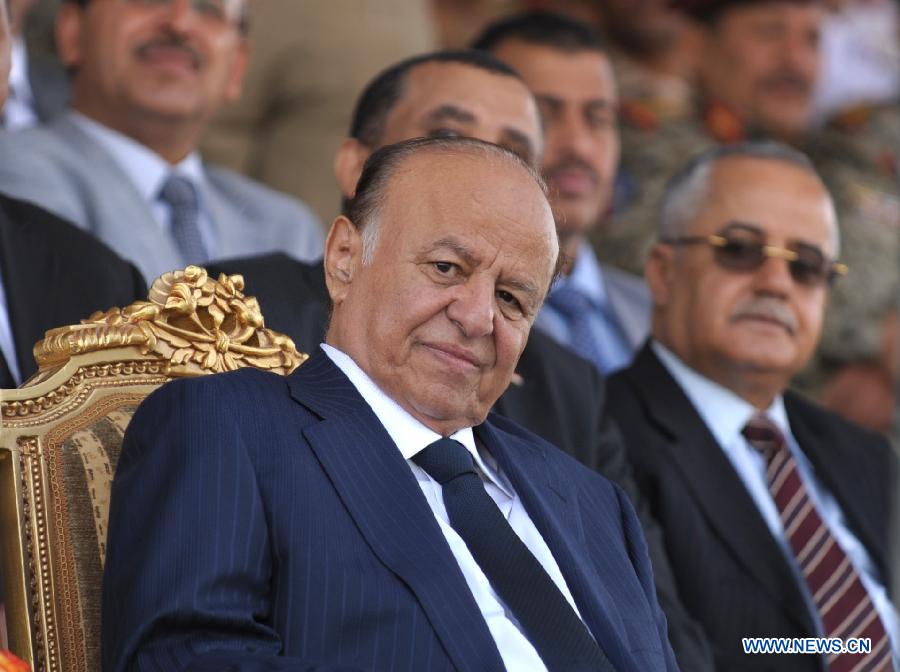Yemeni parliament rejects president Hadi's resignation
 0 Comment(s)
0 Comment(s) Print
Print E-mail Xinhua, January 23, 2015
E-mail Xinhua, January 23, 2015
The Yemeni parliament on Thursday night rejected President Abd-Rabbu Mansour Hadi's resignation and called for holding an emergency session on Friday to resolve the crisis, the parliament said in a statement obtained by Xinhua.
 |
|
The file photo taken on May 22, 2012 shows Yemeni President Abd-Rabbu Mansour Hadi attending the military parade for the 22nd anniversary of the national day of unification in Sanaa, Yemen. Yemeni President Abd-Rabbu Mansour Hadi on Thursday night submitted his resignation to the parliament amid standoff with the Shiite Houthi group who control the capital. The Yemeni parliament on Thursday night rejected Hadi's resignation and called for holding an emergency session on Friday to resolve the crisis. [Photo/Xinhua] |
"The resignation of President Hadi is rejected and we call for holding an emergency session tomorrow," it said in a brief statement.
Yemeni President Abd-Rabbu Mansour Hadi on Thursday night submitted his resignation to the parliament amid standoff with the Shiite Houthi group who control the capital.
"I have bear the responsibility of the presidency since Feb. 25, 2012, but since the events of Sep. 21, 2014 that effect the political transitional process, I'm no longer able to achieve the goal which I was elected for because of the abandonment of other parties which refused to bear responsibility with us to get Yemen into safety out of the political crisis," Hadi said in his resignation letter, a copy of which is obtained by Xinhua.
"I offer my apology to the parliament and to our people after we have reached a dead-end," Hadi added.
United Nations envoy Jamal bin Omar who arrived in Sanaa on Thursday evening was meeting with Hadi on the current crisis, an official at Hadi's office told Xinhua.
The government signed on Wednesday a peace deal with the Houthi group which seized the presidential palace during clashes with presidential guards since Monday.
According to the deal, the Houthi group would withdraw its fighters from around Hadi's house, pull out its fighters from the presidential palace and the nearby military base, and remove all new checkpoints set up.
However, government officials said Thursday that Houthi fighters still seized the presidential palace.
Sultan al-Atwani, one of Hadi's advisors who are among the country's decision-making body, said in an online statement that Hadi submitted his resignation after the Houthi group pressed him to appoint a vice president from the group.
According to Yemen's constitution, the vice president will take over power if the president resigns. Hadi has not appointed a deputy since he was elected president in February, 2012.
Meanwhile, Yemeni Prime Minister Khaled Bahah presented resignation to Hadi, minutes before Hadi submitted his resignation to the parliament.
"Despite the short duration we worked in, the matters in Yemen seems to move in a different direction, therefore we choose to distance ourselves from such destructive political chaos which is not based on either law or logical systems," Khaled Bahah said in his resignation letter.
Khaled Bahah, born in 1965 in Yemen's southeastern province of Hadramout, was named as premier on Oct. 13, 2014.
On Sept. 21, the government and Shiite Houthi group signed a cease-fire deal in Sanaa, both agreeing to stop fighting in the capital that left about 400 people killed, and form a technocrat government.
The Houthi group on Thursday night released a statement on its website to welcome the resignations of Hadi and Bahah.
Ali al-Emad, a member of the Houthi political bureau in Sanaa, said Thursday that the Shiite group is considering to form a presidential council to take over power from the presidency if the parliament approves Hadi's resignation.
The Houthi group trusts the Yemeni people who are able to overcome the crisis and conspiracies laid by the regional and international countries against Yemen, he said.
"The presidential council will be formed by members of the Houthi-led popular committees, the army and other political parties," he said without giving further details.
Security officials said the Houthi group started to deploy fighters around the parliament.
Houthis, who are based in the northern Saad province and demand more rights for the country's Zyadi Shiite Muslims, have expanded influence beyond the capital since late last year.
observers said Hadi's resignation will further deepen chaos in the country.
The impoverish country has seen persistent unrest since 2011 when mass protests forced the former president Ali Abdullash Saleh to step down. Hadi took over power from Saleh in 2012 but failed to implement reforms in the government and army, nor advance reconciliation among political factions.
Yemen has since been facing growing secessionism and al-Qaida networks in the south and armed groups including the powerful Houthi in the north.
Years of unrest also put the country's economy on the brink of collapse. According to data released by Yemen's central bank in early December, Yemen's gross foreign currency reserves slipped to 4.9 billion U.S. dollars in October, as oil exports fell dramatically, exposing the country's fragile public finances.
A senior official in the finance ministry told Xinhua that the foreign reserves would ran out if chaos continue and financial support from Gulf countries, especially Saudi Arabia, could not be resumed.
Gulf countries temporarily halted financial support for Yemen after the Houthi group violently took over control of Sanaa in September.
Gulf foreign ministers on Wednesday accused the Houthi group of provoking violence in Sanaa in a strongly worded statement following an emergency meeting in Riyadh.
The Sunni-dominated Gulf Cooperation Council (GCC) expressed support for the "constitutionally legitimate authority" of Hadi, and insisted that the GCC "would take all measures necessary to protect their security, stability and vital interests in Yemen."






Go to Forum >>0 Comment(s)